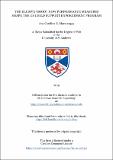Files in this item
The elusive 'good' : how performance measures shape the US child support enforcement program
Item metadata
| dc.contributor.advisor | Roscoe, Philip | |
| dc.contributor.advisor | Russell, Shona | |
| dc.contributor.author | Macatangay, Ana Carolina | |
| dc.coverage.spatial | [5], 246 p. | en_US |
| dc.date.accessioned | 2019-06-14T09:15:55Z | |
| dc.date.available | 2019-06-14T09:15:55Z | |
| dc.date.issued | 2019-06-28 | |
| dc.identifier.uri | https://hdl.handle.net/10023/17890 | |
| dc.description.abstract | Performance measures do not just capture an organization’s ‘good performance’; they intervene in the valuation and construction of what counts as ‘good’ so it can be valued, enacted, and measured. This is the central theme of this thesis. Using a performativity lens, and drawing on valuation studies and the sociology of quantification, this research investigates the framing processes and mechanisms by which the federal performance measures, through a network of actors and devices, enable a U.S. child support enforcement agency to enact the ‘good performance’ that can be measured. Using ethnographic and case study methods, the study examines how actors and devices, through a framing process, qualify and negotiate the boundaries of their interactions to produce the ‘good performance’ that can be counted and measured. The boundaries they establish, however, produce overflows that potentially threaten the production of the qualified and quantified ‘good’. Such overflows emerge due to unexpected events, different versions of ‘good’, and conflicting frames of valuation of what counts as ‘good’. Based on the findings, the study offers a taxonomy of performative framing to explain how measures stimulate the organizing work of an agency so the ‘good performance’ can be organized, articulated, produced, and validated. It also offers a taxonomy of counter-performation to describe the uncertainties, multiplicities, and rivalries that the measured ‘good performance’ generates. | en_US |
| dc.language.iso | en | en_US |
| dc.publisher | University of St Andrews | |
| dc.rights | Attribution-NonCommercial-NoDerivatives 4.0 International | * |
| dc.rights.uri | http://creativecommons.org/licenses/by-nc-nd/4.0/ | * |
| dc.subject | Performativity | en_US |
| dc.subject | Valuation | en_US |
| dc.subject | Agencement | en_US |
| dc.subject | Performance measures | en_US |
| dc.subject | Framing and overflowing | en_US |
| dc.subject | US child support enforcement program | en_US |
| dc.subject.lcc | HV741.M2 | |
| dc.subject.lcsh | Child support--United States--Evaluation | en |
| dc.subject.lcsh | Child support--Government policy--United States | en |
| dc.subject.lcsh | Performance--Evaluation | en |
| dc.title | The elusive 'good' : how performance measures shape the US child support enforcement program | en_US |
| dc.type | Thesis | en_US |
| dc.contributor.sponsor | University of St Andrews. School of Management | en_US |
| dc.contributor.sponsor | Russell Trust | en_US |
| dc.type.qualificationlevel | Doctoral | en_US |
| dc.type.qualificationname | PhD Doctor of Philosophy | en_US |
| dc.publisher.institution | The University of St Andrews | en_US |
| dc.identifier.doi | https://doi.org/10.17630/10023-17890 |
The following licence files are associated with this item:
This item appears in the following Collection(s)
Except where otherwise noted within the work, this item's licence for re-use is described as Attribution-NonCommercial-NoDerivatives 4.0 International
Items in the St Andrews Research Repository are protected by copyright, with all rights reserved, unless otherwise indicated.


